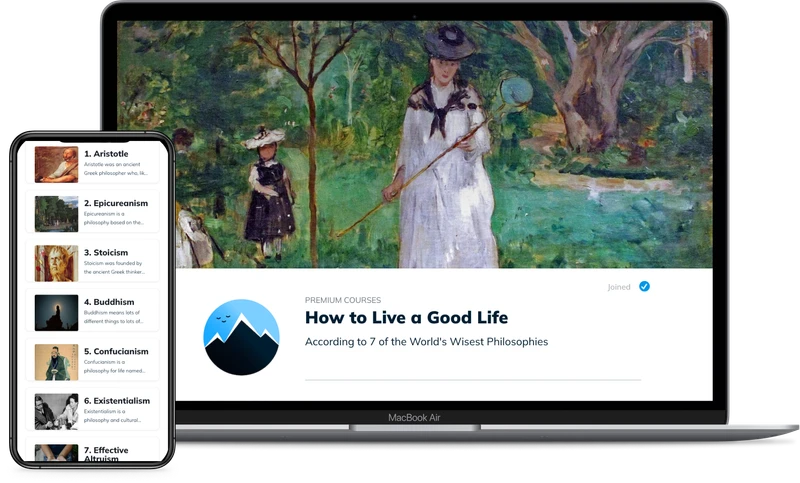
Kierkegaard On Finding the Meaning of Life
Scientific explanations of reality will never provide us with purpose, Kierkegaard argues, for by abstracting away our subjectivity we strip the world of meaning. To find reasons for getting out of bed in the morning, preserving our first-person perspective is crucial.

Often labeled as the first existentialist philosopher, Danish thinker Søren Kierkegaard was a voracious writer (see our reading list of Kierkegaard’s best books here). Wittgeinstein described him as the most profound thinker of the 19th century, and his many works are filled with rich nuance and insight on a wide diversity of subjects.
One of the most prominent themes in Kierkegaard’s work is his critique of the ‘rational detachment’ practiced by the philosophical tradition that came before him — and how such practice fails to provide us with insight into topics like the meaning of life.
Kierkegaard especially targets his contemporary, the German philosopher Hegel, whom he saw as continuing this tradition by attempting to write from a ‘view from nowhere’ — attempting to be detached and objective, when of course, writing from a very particular and singular human perspective, Hegel had a claim on neither of those things.

Kierkegaard’s insight is that, by attempting to abstract away our subjectivity, philosophy loses its power to move or be relevant for us.
Scientific explanations of reality, then, are all well and good; but what about our actual lived experiences? What does rational detachment do for us when we are striving to find meaning and purpose — something to live for?
We don’t want mere descriptions, Kierkegaard thinks, and we don’t want mere explanations; rather, we want reasons for getting out of bed in the morning — and we won’t find such reasons by erasing the subjective ‘I’ from our picture of the world.
As Kierkegaard writes in his journal in 1835:
What I really need is to get clear about what I must do, not what I must know, except insofar as knowledge must precede every act... [T]he crucial thing is to find a truth which is truth for me, to find the idea for which I am willing to live and die.
Even if we had total objective knowledge of the universe, Kierkegaard suggests, that wouldn’t tell us what we ought to do or how we ought to live our brief, limited lives.
The upshot from much of Kierkegaard’s work is that, by stripping subjectivity from the world, we strip meaning from the world. If we want to find reasons to live, preserving the first-person perspective is paramount.
The question, then, is not ‘what is the meaning of life?’ — the question is ‘what is the meaning of life for me?’
In one concise email each Sunday, I break down a famous idea from philosophy. You get the distillation straight to your inbox:
💭 One short philosophical email each Sunday. Unsubscribe any time.
The answer for each of us, Kierkegaard thinks, must involve some kind of ‘leap’ beyond rational detachment. For him specifically, it was a leap into religious faith; but later existentialist philosophers built on Kierkegaard’s initial insight to offer more secular responses.
Kierkegaard’s influence on existentialism
Following Kierkegaard, most existential philosophers generally think that, while scientific explanations do give us real and useful knowledge about the world, such ‘objective’ rational detachment does not help us understand our actual lived experience or indeed how we ought to live, for ignoring the first-person perspective ‘disenchants’ the world and strips it of meaning.
In other words, if we only rely on science’s rational detachment, we will not beat the problem of nihilism, for we want to know what existence means for us.
As the French philosopher Albert Camus wrote:
It is legitimate and necessary to wonder whether life has a meaning.
And it is Kierkegaard’s emphasis on the first-person perspective that enables existentialism to investigate such meaning. It informs and lays the conceptual groundwork for finding solutions to the problem of nihilism that — due to their use of ‘objective’ rational detachment — science and traditional philosophy simply cannot offer.
Friedrich Nietzsche, for instance, though unlikely to have read Kierkegaard directly, is thought to have been familiar with his ideas through secondary literature, and puts forward a similar critique of rational detachment — that it cannot provide us with meaning. After declaring God is dead, Nietzsche presents his character of the Übermensch — rather than science — as a replacement source of meaning and value.
20th-century philosophers Edmund Husserl and Martin Heidegger, meanwhile, build new categories of experience in their phenomenological understanding of reality (see Heidegger’s discussion of authenticity), deeply influencing the meaning-making approaches of Jean-Paul Sartre (who sloganized their insights with the pithy statement, existence precedes essence) and Simone de Beauvoir (our quick existentialism explainer explores this further); Camus responds to absurdity by encouraging us to cultivate a spirit of defiant acceptance; while Thomas Nagel proposes we approach our existential situation with humor, rather than despair. Even Robert Nozick suggests that by viewing ourselves a certain way, we can live meaningfully in a vast universe.
Given its far-reaching influence, what do you make of Kierkegaard’s initial analysis? Do you think scientific explanations of reality are capable of providing us with reasons to get out of bed in the morning? Or do you agree with Kierkegaard — that such reasons must come from within?
Learn more about Kierkegaard and existentialism
If you’re interested in learning more, you might like our quick articles on Kierkegaard’s critique of busyness and his observation that while we understand life backwards, we must live forwards — as well as our reading lists on Kierkegaard’s best books and existentialism’s best books.
If you’d like to dive deeper into existentialist (and other philosophical) responses to nihilism, consider signing up for our new guide, How to Live a Good Life, which compares the wisdom of 7 rival philosophies for life — including existentialism, Buddhism, and Stoicism.

How to Live a Good Life (According to 7 of the World’s Wisest Philosophies)
Explore and compare the wisdom of Stoicism, Existentialism, Buddhism and beyond to forever enrich your personal philosophy.
Get Instant Access★★★★★ (100+ reviews for our courses)
About the Author

Get one mind-opening philosophical idea distilled to your inbox every Sunday (free)

From the Buddha to Nietzsche: join 20,000+ subscribers enjoying a nugget of profundity from the great philosophers every Sunday:
★★★★★ (100+ reviews for Philosophy Break). Unsubscribe any time.

Take Another Break
Each break takes only a few minutes to read, and is crafted to expand your mind and spark your philosophical curiosity.





